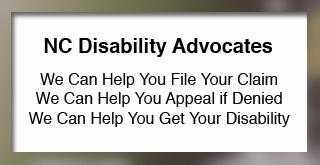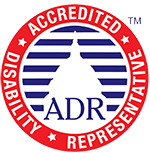by Tim Moore. Free Case Evaluation here. If you live in Warrenton, North Carolina, you…

Applying for Disability in Durham, North Carolina
Home » Applying for Disability in Durham, North Carolina
by Tim Moore. Free Case Evaluation here.
If you live in Durham NC and have applied, or are thinking of applying for disability, you probably have several basic questions, but you may also be worried about how long will it take to get a decision, what your chances of being awarded disability are, and how much you can get. First, let’s start with the most basic question, which is how and where you apply for disability.
Note: if you need assistance with your disability claim, contact us at: 919-890-8519.
Filing for Disability in Durham
If you live in Durham or Durham county, you can file for disability online using the SSA website. However, filing online is confusing, takes a lot of time, and can lead to mistakes. We advise that you contact your local office since that office will have jurisdiction over your case. Once you contact the Durham District office to start a disability claim, they will set an appointment for you to be interviewed. Here is their contact information:
Social Security Administration
3511 Shannon Rd #200
Durham, NC 27707
(888) 759-3908

Note: If our office represents your claim as your disability representative, we will contact Social Security and get your appointment scheduled for a disability application interview to be done by phone. We have found that this is the most efficient way to get your claim started.
How the process starts
Social Security will conduct a disability interview (which can be done over the phone) during which you will be asked questions about: your physical and mental conditions; your medical treatment; your medications; your work history for the last 15 years.
The interview gets your claim started and establishes the basis for your claim being worked on. To provide accurate information and to avoid leaving out information, we advise that you write things down in advance.
- Your Work history – List all your jobs for the last 15 years. Include job titles, employers, employment dates for each job, and describe your duties for each job as you actually performed those duties. Social Security will review these jobs to see if you can go back to any of them so give accurate information.
- Your Medical Conditions – Write down ALL your physical and mental medical conditions. Social Security will consider all your conditions. If you have a condition but haven’t actually been treated for it, such as depression, SSA will probably send you to a consultative medical exam, or CE. This will be performed by a private practice doctor. A CE can include mental or physical testing and can last more than an hour or as little as 10 minutes. Keep in mind, however, that your best medical records will be from doctors who have treated you.
- Your Medical Treatment Sources – List all your doctors and which clinic or hospital they work at. Include addresses. Include your first and most recent dates of treatment. Social Security needs your older records to document when your disability began which can affect how much back pay you are owed and when your medicare begins if your claim is for SSD; if your claim is for SSI you will receive medicaid, not medicare. Your most recent records are needed to prove that you currently meet the requirements for receiving disability benefits.

Note: Providing the names and addresses of your doctors is important to whoever represents you because they will need to get a type of “letter”, or medical source statement, from at least one of your doctors to support your case. This is generally done at the disability hearing where a judge is involved.
- Your Medication list – Get your medication bottles and write down the names and dosages for each medication. Also list what condition it is for, who prescribes it, and how often you take it. Do not list past medications, just the ones you currently take.
Recording this information ahead of time will help ensure that you do not leave anything out and will speed up the interview and make it less stressful. And here is a helpful tip: After the interview, keep what you have written because if you are contacted by the examiner deciding your case, they may ask you some of the same questions.
How long does it take to get a decision?
A disability application can take as little as a month, or as long as six months. If you are denied, a requestion for reconsideration can be done. This usually takes about one to three months. If this appeal is denied, a request for a hearing should be filed. It can take a year or more to get a hearing date.
What are my chances of winning?
If you have been denied on your application, the hearing will be your best chance of winning for a couple of reasons. The first is that you will actually meet the person who decides your claim. Secondly, a representative can obtain evidence and statements to support your claim along with a reasoned argument for why your claim satisfies Social Security requirements. This is exactly why your representative should always be someone who specializes in Social Security cases only. Never use an attorney who dabbles in other areas of law. Most likely, they will not know much about how the Social Security system, which is very complex, works.
How much can you get for disability?
Security can give you an estimate of your monthly benefit when you apply and benefits can be as high as $2600/mth for some individuals. But your benefit amount will be based on your work history and earnings. Generally speaking, you must have worked at least five out of the last ten years to be insured to receive SSD.
What if you are not insured for SSD? If you did not work at all, did not work very long, or you stopped working more than five years ago, your application may be for SSI, or supplemental security income. Since SSI is not based on your earnings and is a need-based program, there is one maximum amount. To see the current amount, visit SSA.gov.
If you go to a disability hearing
On the day of the hearing, you (and us if we represent you) will appear at the scheduled time. The judge may ask you questions, allow your representative to ask questions, and may also have a vocational expert present to testify about your ability to return to work.
Obviously, preparation for the hearing is very important and goes beyond simply getting medical records. How you respond to questions from the judge can impact the quality of your testimony. Your goal is to be completely truthful in your answers, but also to provide the information in your answers that the judge actually needs from you. And this can be difficult for someone who is not accustomed to being questioned in a hearing setting, which is why representation can be very important.
Note: Residents of Durham city and Durham county fall under the jurisdiction of the hearings office in Raleigh, NC.
Free Case Evaluation
Seventy Percent of disability applications are denied in North Carolina. Complete the form below to get help with your disability claim. We are local, we understand how the system works in NC, and our consultation is FREE. After submitting, please scroll to the bottom for the confirmation that your form was sent, and to copy our phone number if you have further questions.
Related Posts
- Applying for Disability Warrenton North Carolina
- Filing a disability appeal in North Carolina
by Tim Moore. Free Case Evaluation here. Doing a Disability Appeal in North Carolina Roughly…
- Disability determination services in North Carolina
NC Disability Determination Services by Tim Moore. Free Case Evaluation here. Information about NC DDS…
